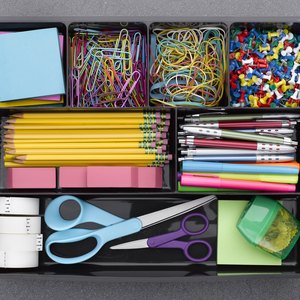
Look around your office. Chances are that there are some supplies around, whether it’s at home or in an office building. You can deduct the cost of office supplies on your tax return if you’re self-employed and the costs are "ordinary and necessary" to your business.
Deducting Office Supplies
Reliance on computers has certainly reduced the need for office supplies, but you still likely use items like paper, pens and paper clips at least occasionally. You can deduct the cost of office supplies along with the other expenses associated with running your business if you're self-employed.
You can’t claim this tax deduction if you work for an employer and you purchase your own office supplies. It used to be that you could claim unreimbursed employee expenses, but the Tax Cuts and Jobs Act eliminated those tax deductions when it went into effect in 2018. You can ask your company if reimbursement is an option if your employer doesn't provide you with office supplies and you're working from home for some reason, perhaps due to the ongoing pandemic.
Office Supply Eligibility Test
You must be able to prove to the satisfaction of the IRS that there was a business use for your purchase of office supplies. The IRS requires that deductible business expenses must be ordinary and necessary in your field of work. Ordinary means that the expense is common in your industry, while a necessary expense is one that is helpful for business purposes. It doesn't have to be "indispensable," according to the IRS. It's just useful in your line of work.
You must also be able to show that you’re engaged in an activity that's geared toward generating income. You don’t have to actually generate income at first, but the IRS may begin to question your deductions if you continually operate at a loss for multiple years.
What You Can Deduct
Whether you work in an office suite or out of your home, most of the items you find at office supply stores qualify as business deductions if you're self-employed. This includes purchases like printers, printer cartridges, paper, postage, flash drives and storage devices and invoice and receipt books.
Offices with employees have even more deductions, including cleaning supplies, toilet paper and items for the break room like paper plates and plastic utensils. Keep receipts and records of every item you plan to deduct.
Read More: Tax-Deductible Items When Filing a 1099
When to Deduct Office Supplies
You must claim office expenses in the year you purchased the item in most cases. It gets a little more complicated if you pay the bill in a different tax year because you use the accrual method of accounting.
Maybe you ordered toner cartridges for your business in December and they arrived that same month. You can claim them in that tax year even if the bill doesn’t arrive until January. Yes, it’s a new tax year, but the IRS merely requires you to claim it in the year “economic performance” occurs, not the year the expense was paid.
How to Claim Office Supplies
Use Schedule C, "Profit or Loss From Business," to claim deductions for business expenses, including office supplies. Expenses are itemized under Part II. Schedule C also asks you to list all your sources of income and your business expenses as listed are subtracted from your gross income to arrive at your taxable income.
The items you’re claiming should be used within the tax year in which you’re claiming the deduction. But it’s fairly likely you’ll purchase items that will last into the next year. You can claim the cost of office supplies in the year in which you purchased them, as long as your accounting clearly shows that you’re making an income. It can help to review Schedule C to get a feel for what you can deduct. Most of your supplies will go under Part II, Line 22.
Claiming Computer Equipment
Large purchases like equipment are a little more complicated. You’ll spend more for items like laptops and computers, and you'll most likely use them well beyond the current tax year. You must depreciate the cost of certain items in this case.
You can claim the cost of your personal computer if you use it for your business part of the time, but you must calculate the percentage of time it's used for work purposes and you can claim only that percentage. The cost of a $1,400 computer that you use 51 percent of the time for business will be reduced to $714 before you start the depreciation process.
You can only depreciate the percentage cost of the computer if you use it for business purposes more than 50% of the time. A computer’s useful life is five years for tax purposes, so you would divide that $714 in our example by five and claim one-fifth on Schedule C over five years.
Claiming Office Space
Businesses that lease or own office space can claim the cost on their tax return. The same goes if you’re self-employed and you work from home. You must have space that's dedicated solely to your work to be able to claim a home office deduction. Your kitchen table won’t count as your home office because you don’t use it exclusively for work.
You have two options for deducting office space. The easiest way is the simplified method. It lets you simply deduct $5 per square foot of workspace up to a limit of 300 feet. Your other choice is to calculate how much of your home’s square footage is dedicated to your office. Then you’ll divide the costs associated with maintaining your home by that amount.
You can claim the square footage equivalent of your rent or mortgage interest (but not the principal part of your mortgage payments), real estate taxes, insurance, utilities, maintenance and repairs. Your home office deduction would be $450 a month if these costs total $3,000 a month and your workspace takes up 15 percent of your entire home's square footage: $3,000 times .15.
Deducting Furniture and Décor
A big, empty room won’t help you conduct business. You’ll need at least a desk and chair. The IRS lets you deduct that, too. You can deduct its cost in the year in which you purchase it, or depreciate it over its useful life. It's seven years for furniture.
Claiming these tax deductions can reduce your tax liability each year if you’re self-employed and you're working from home. Just make sure you keep receipts and maintain records of any calculations you used to arrive at the deduction you claimed.
References
- IRS: Deducting Business Expenses
- NOLO: How to Prove Your Hobby Is a Business
- IRS: Publication 334 (2020) Tax Guide for Small Business
- IRS: Schedule C Profit or Loss From Business
- IRS: 2021 Instructions for Schedule C
- IRS: Publication 587
- IRS: Publication 946 (2020), How To Depreciate Property
- IRS: Topic No. 509 Business Use of Home
Writer Bio
Stephanie Faris has written about finance for entrepreneurs and marketing firms since 2013. She spent nearly a year as a ghostwriter for a credit card processing service and has ghostwritten about finance for numerous marketing firms and entrepreneurs. Her work has appeared on The Motley Fool, MoneyGeek, Ecommerce Insiders, GoBankingRates, and ThriveBy30.
